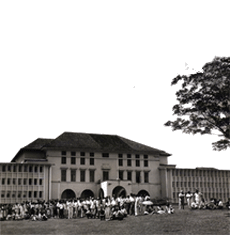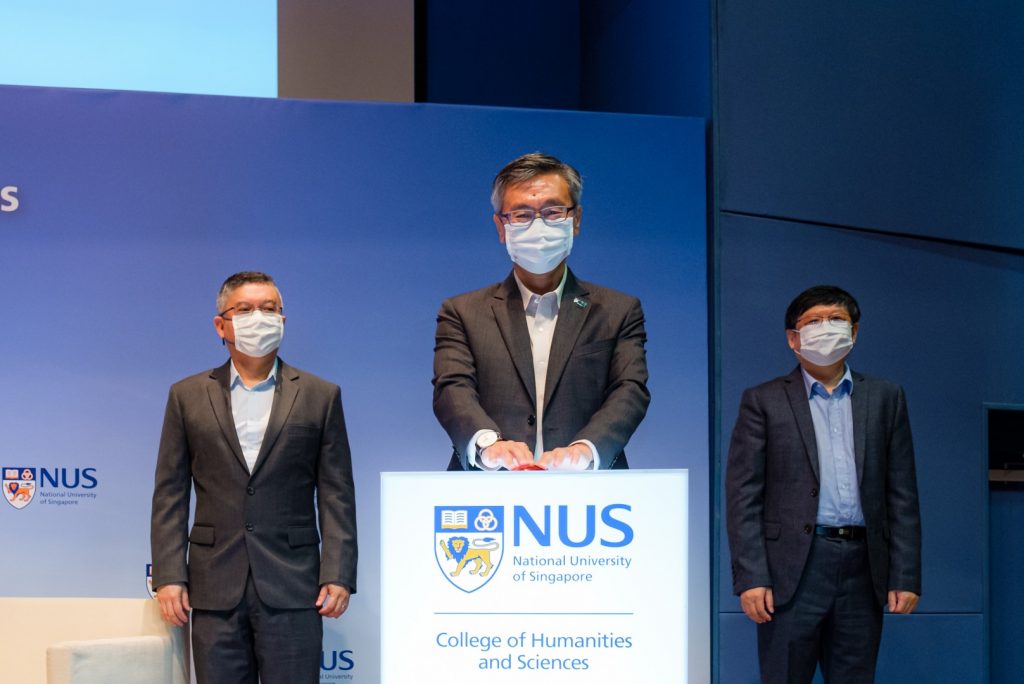Role, Mission & Heritage
Role
Applying the arts and social sciences for greater good.
Mission & Vision
Our Mission
To contribute to society through the advancement of knowledge and learning in the humanities and social sciences.
The FASS mission comprises three parts. It emphasises:
-
- Advancement of knowledge through research.
- Advancement of learning through education.
- Service to society.
Our Vision
The FASS will be distinguished in education, research, social commitment, and the vibrancy of its community.
It will:
- Be a leading centre of research, and the leader in Asian Studies;
- Offer outstanding education in the humanities and social sciences, attracting the best students;
- Be home to an intellectual community with strong social commitment, eliciting pride and belonging from its students, staff and alumni.
History of FASS
From humble beginnings to a world-class institution
The Faculty of Arts and Social Sciences has a rich history going back from the year 1929 to present day, complementing its diverse subjects offered to its students. Initially having only four subjects (English, History, Geography and Economics); the Faculty has now grown to accommodate 16 departments with a variety of subject combinations to suit an individual’s interest and expertise.
Specialised minors such as Gender Studies, Health and Social Sciences, and Urban Studies, as well as Freshman Seminars allow students to explore other educational opportunities apart from their individual majors. Its success in attracting both faculty and students rely heavily on its constant need to reinvent itself with new programmes and courses, alongside establishing partnerships with overseas universities.
Currently, the Faculty has partnerships with the Australian National University, King’s College London, University of North Carolina – Chapel Hill, University of Edinburgh and University of Toronto in joint degree programmes and student exchanges. One of the most recent additions to the Faculty is the Bachelor of Environmental Studies (BES), jointly offered by FASS and NUS Faculty of Science. This new bachelor degree programme strongly highlights the faculty’s desire to allow students more choices in study and research.
1929
Raffles College was founded.
Students were not grouped into faculties, but, in the main, took courses in one of three main groups of subjects:
English, History, Geography, Economics and Education;
Physics, Chemistry, English, Mathematics and Education;
Mathematics, English, Physics, Chemistry or Geography and education.
1929
Raffles College merged with the King Edward VII College of Medicine to form the University of Malaya, and a Faculty of Arts was established with five departments - English, Geography, History, Economics and Statistics and Mathematics.

1952
Social Work as a subject in the University was started, when it offered the first professional social work qualification in Singapore, the two-year Diploma in Social Studies.
1953
The Department of Chinese Studies was established.
1954-55
Philosophy, which began as a sub-unit of the English department in 1952–53, attained full departmental status.
1959
The University of Malaya was divided into two autonomous entities - the University of Malaya in Kuala Lumpur and the University of Malaya in Singapore.
1961
The Department of Political Science was created.
1962
The University of Malaya in Singapore officially became the University of Singapore.
1965
Departments teaching 'quantitative' subjects, namely Economics, Sociology, Political Science, Applied Social Studies and Business Administration (then taught at the Arts Faculty) were brought under one roof. This brought about the creation of a Faculty of Social Sciences in March 1966.
1966
Sociology was taught for the first time in the University.
1967
The Department of Malay Studies was founded.
1969
To allow students to choose from a wider range of subjects, the Faculty of Arts was amalgamated with the Faculty of Social Sciences to form a unified Faculty of Arts and Social Sciences.
1980
The National University of Singapore (NUS) was established.
The Department of Chinese Studies (established in 1953), Faculty of Arts and Social Sciences of the former University of Singapore; and the Department of Chinese Language and Literature (established in 1955), Faculty of Arts of the former Nanyang University merged to become one Department of Chinese Studies.
1981
A Japanese Studies department was set up in the Faculty with assistance from the Japanese Government.
1982
A Centre for Advanced Studies was set up.
1986-87
Psychology as a subject of study was introduced into the Faculty as part of the Department of Social Work.
1991
- The Department of Mass Communication was created.
- Southeast Asian Studies, European Studies and Linguistics Programmes were launched.
1992
- The Mass Communication Department was moved to Nanyang Technological University.
- The Public Policy Programme in the Faculty of Arts and Social Sciences was established.
1995
The American Studies Centre was set up.
1999
The South Asian Studies Programme and the Information and Communications Management Programme were established.
2001
- Office of Programmes was established, offering 3 multidisciplinary, cross-departmental programmes: American Studies, European Studies, Master of Social Sciences (International Studies).
- A Centre for Language Studies was established to oversee all language learning and to create greater synergies for innovative language teaching. Nine languages were offered – Bahasa Indonesia, Chinese, Japanese, Malay, Tamil, Thai, Vietnamese, French and German.
- American Studies Centre was designated a cross-departmental programme and came under the purview of the Office of Programmes.
- The Centre for Advanced Studies and the Centre for Research in Chinese Studies ceased operations, as the independent Asia Research Institute was established.
2002-03
- Approval was obtained for four minor programmes to be offered in academic year 2003-04:
-
- Minor in Urban Studies
- Minor in China Studies
- Minor in English Studies
- Minor in Economics
-
2004-05
- The Public Policy Programme ceased operations under the auspices of the Faculty of Arts and Social Sciences and was expanded to become the independent Lee Kuan Yew School of Public Policy in August 2004.
- Approval was obtained for three minor programmes to be offered in academic year 2005-06:
- Minor in Gender Studies
- Minor in Cultural Studies
- Minor in Religious Studies
- The first joint Honours degree, in Actuarial Studies and Economics, was offered by the Australian National University and the NUS.
2005-06
- The Information and Communications Management Programme was restructured to form the Communications and New Media Programme.
- The Department of Social Work and Psychology became two separate departments - the Department of Social Work and the Department of Psychology with effect from 1 July 2005.
- A five-year double Honours degree in Economics and Law was offered by the NUS Faculty of Arts and Social Sciences and the Faculty of Law with effect from academic year 2005-06.
- An Honours Programme in Malay Studies was offered with effect from academic year 2005-06.
2006-07
- Approval was obtained for two minor programmes to be offered in academic year 2006-07:
- Minor in Science, Technology and Society (STS)
- Minor in Geographical Information Systems (GIS)
- A second double Honours degree programme was started in academic year 2006-07. Offered by the NUS Faculty of Arts and Social Sciences and the Faculty of Engineering, the Double Degree Programme is in Economics and Engineering.
- An Honours Programme in South Asian Studies was offered with effect from academic year 2006-07.
2007-08
- A second joint Honours degree between the Australian National University (ANU) and NUS began in 2007. This is a Joint Degree Programme in Theatre Studies, English Literature, History and Philosophy.
- A third joint Honours degree was offered, between the University of North Carolina at Chapel Hill and the NUS. The first intake of students on this programme was in academic year 2007-08.
2008-09
- A new PhD programme in Cultural Studies in Asia was offered in academic year 2008-09.
- Two new minor progammes were offered in academic year 2008-09.
- Health and Social Sciences
- Geosciences
- Freshman Seminars were launched in 2009.
2009-10
- A Double Major in Economics and Mathematics/Applied Mathematics was offered to students in academic year 2009-10
- A Joint PhD Studies Agreement with King’s College, London was signed on 9 April 2010 , for a jointly supervised PhD programme involving several departments; History, Geography, English and Philosophy and War Studies at King’s and FASS.
2010-2011
- A double degree programme in Economics and Business Administration/Accountancy was offered in academic year 2010-11.
- An MOU was signed with the University of Toronto to finalise the Joint Minor programme on 14 March 2011. The following minor programmes were offered since academic year 2009-10.
-
- Minor in Urban and Regional Change in North America
- Minor in Asian Geographies
- An MOU was signed with the University of Edinburgh to establish joint PhDs in April 2011.
- The Communications and New Media Programme and Southeast Asian Studies Programme were re-designated to Departments with effect from 1 July 2011.
- The Bachelor of Environmental Studies (BES) was offered jointly by the NUS Faculty of Science and Faculty of Arts and Social Sciences with participation from the Faculty of Engineering, Faculty of Law, School of Design and Environment and School of Business, in academic year 2011-12.
2013
- A new multidisciplinary major in Global Studies was launched.
- The PhD Programme in Comparative Asian Studies was established.
- FASSTrack Asia comprising courses from the Faculty's Asian Studies Division, Humanities Division and the Social Sciences Division was launched. The Summer School courses are focused on Asia, some featuring a five to nine day field trip to the country of study.
2016
- Introduced faculty-level credit-bearing internship modules (i.e. courses).
- Introduced Writing, Expression and Communication (WEC) modules (courses) which are compulsory for all FASS undergraduates from Cohort 2016 onwards.
2017
- Introduced a Computational Thinking component which is compulsory for all FASS undergraduates from Cohort 2017 onwards.
2019
- Introduced the FASS 2.0 Industry Tracks providing students a pathway to the following market sectors: Public Administration; Communications, Advertising and Media; Banking and Finance; Society, Community and Health; and, Arts, Culture, Entertainment and Heritage.
- Established the Politics, Philosophy, Economics (PPE) programme: the multidisciplinary study of social and political phenomena. PPE students benefit from a curated suite of multi-purpose intellectual tools from Philosophy, Political Science and Economics.
- The FASS 90th Anniversary Golf Tournament raised S$571,652 for the new FASS Alumni Bursary Fund.
- Celebrated 90th Anniversary with a series of events, including a number of book launches, seminars, conferences, roundtables for students, alumni and the public.
- Launched the FASS Social Incubator Programme Fund, which will provide funding and faculty guidance for students working on and co-developing social advancement and social entrepreneurship initiatives.
- Announced the FASS Student Advancement Fund, which provides financial assistance for students to participate in NUS educational opportunities outside of the classroom.
2020

- Established the Career Advancement for FASS Educators (CAFÉ) Committee as a platform to help Educator Track instructors withtheir career and pedagogical development.
- Established a new Minor Programme in Asian Studies starting semester 1, academic year 2020-21.
- Adopted full online learning and assessment for the vast majority of FASS undergraduate modules (courses) in semester 1, academic year 2020-21, in view of the Covid-19 pandemic.
- On Dec. 8, 2020, the National University of Singapore (NUS) launched the College of Humanities and Sciences (CHS), a collaboration between Faculty of Arts and Social Sciences (FASS) and the Faculty of Science (FoS). CHS will offer an interdisciplinary common curriculum and student-centric pathways built upon the deep research expertise of the two faculties.

